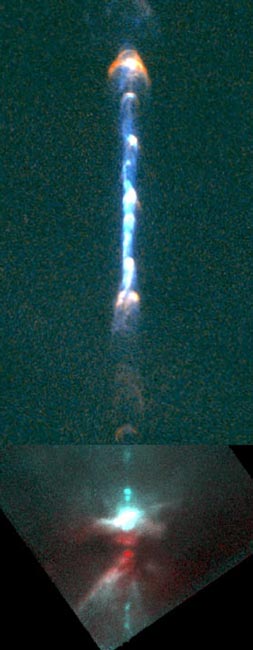Astronomy Picture of the Day
Discover the cosmos! Each day a different image or photograph of our fascinating universe is featured, along with a brief explanation written by a professional astronomer.

Credit: Bo Reipurth (CASA/U. Colorado) et al., HST, NASA |
Explanation: The complex interactions of three stars in the Orion B molecular cloud complex have resulted in the ejection of particles along a 12 light-year long jet. One of the stars in the HH111 system has apparently also been ejected leaving two stars tightly bound in a binary orbit. The spectacular jet emanates from one of these two stars. The complete system is quite complex and involves another less-luminous jet and disks of rapidly rotation gas. In the top part of this Hubble Space Telescope image taken in visible light, successive bubbles are seen to move along the jet. At the bottom in infrared light, a torus of dark dust and gas from which the stars formed millions of years ago can be seen. Protons and electrons zip along near 500 kilometers per second in the HH111 jet, which is about 1500 light-years away. |
< | Archive | Index | Search | Calendar | Glossary | Education | About APOD | >
Authors & editors:
Robert Nemiroff
(MTU) &
Jerry Bonnell (USRA)
NASA Technical Rep.:
Jay Norris.
Specific rights apply.
A service of:
LHEA at
NASA/
GSFC
&
Michigan Tech. U.